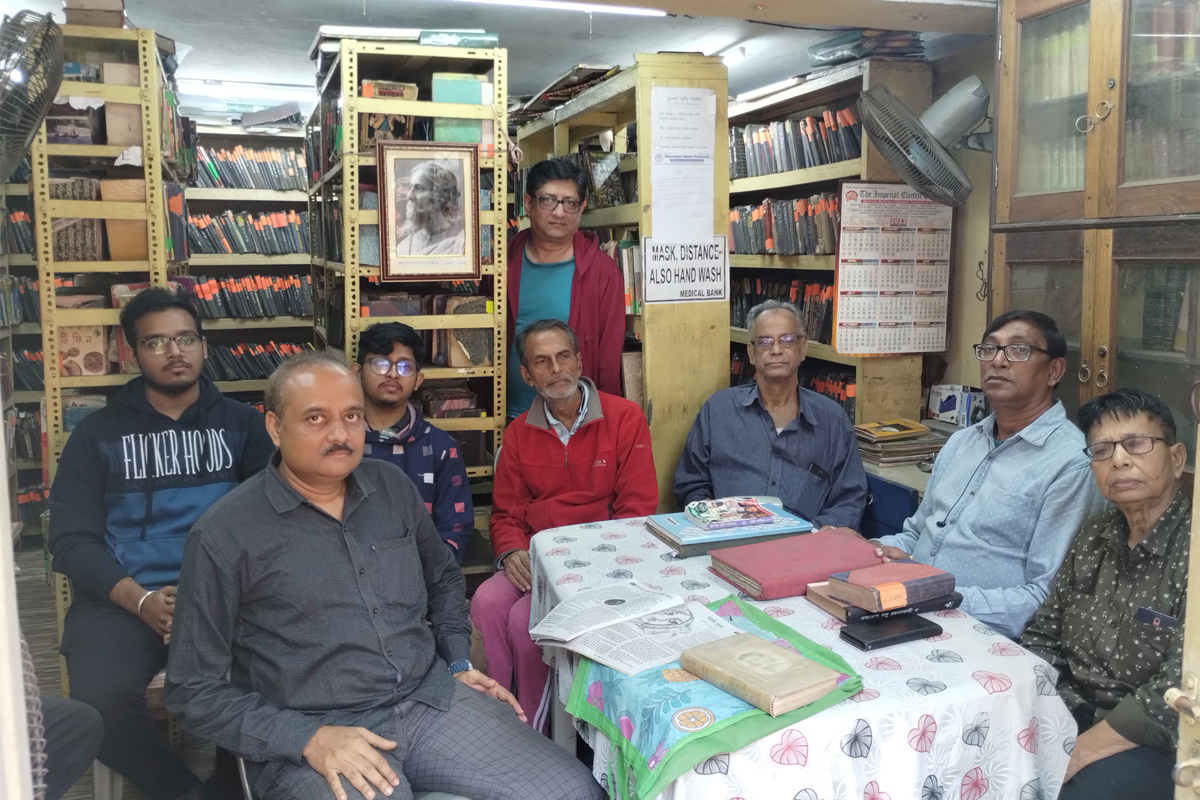Locals of Motijheel, Chinsurah recollect memories of Pratul Mukhopadhyay
The renowned Bengali-language singer Pratul Mukhopadhyay was a creative artist and songwriter.
Though numerous Bengali well-known and noble personalities have expressed a desire to run this library and reinvent it through cultural events, the politicians are not keen on letting go, said the regulars of this library to The Statesman over a cup of tea.
PURBASHA KARMAKAR | Kolkata | January 16, 2024 1:49 pm

Through the commercial lanes of the ‘Babu Kolkata’ in Sovabazar, bustling with hubbub of busy markets, throngs of labourers and traders, and the sounds of religious events happening in the vicinity, lies Bhupendra Smriti Pathaghar, a small one-storey library that is almost a forgotten heritage. In this age when we are increasingly shying away from books and depending upon digital platforms to earn knowledge, the Bhupendra Smriti Pathaghar stands as a gem for the bibliophiles in one of the alleys of Sovabazar at 15 Kripanath Lane, Kolkata. It has retained its glory for over a century but has currently lost out to public apathy, mainly due to digitalisation.
Founded in 1940, during the ongoing turmoil of independence, this library was established as a sister concern of a club named Tarun Milan Sangha by Advocate Bhupendra Rai Chowdhury and renowned freedom fighter Sajanikanta Sen. It is reported that a few bookworms of that era contributed to this library with bits and pieces like books, cabinets and wardrobes for its basic growth.
Advertisement
Where piles of moth-eaten, decade-old books lie abandoned on the corridors and staircases of huge government-aided libraries, this library has always given tender solicitude to each of its books. The collection of over 9,000 Bengali novels, poetry, biographies, periodicals, magazines and even non-native books is kept here under the watchful eyes of two early and prominent members, namely, Tapan Dutta and Govinda Roy. Many of the books in this collection have surpassed a century since their inception and remain in pristine condition. While the inevitable ageing process may cause degradation in some volumes, the same holds true for this library. Works like Bongodarshon, Suktara, Anandalok, and various other vintage and classical novels, along with publications centred on Kolkata, grace its shelves. Additionally, one can discover books here that were priced at merely one or two annas, even in more recent times. This British-era building even has a history of being on the verge of destruction during the Naxalite movement.
Advertisement
Public indifference has dealt a blow to this 83-year-old bibliotheca. It faces a multitude of challenges, including political intervention, insufficient funds and persistent internal conflicts among its members and underpaid staff. These factors collectively pose a formidable obstacle to the survival of a library boasting an extensive collection of Bengali books.
Tapan Dutta, the secretary who has headed the library for the past 40 years, said, “This library receives a yearly grant of only Rs 25000 by the state government to keep its doors open with culture, education and research for bookworms of the present generation. It is also sometimes funded by the ‘Raja Rammohan Roy Library Foundation’, which is a central autonomous organisation established to provide financial and technical assistance to libraries lacking it. As this library is inside a constricted space, there is no space for technological advancements like computers or printing machines. Therefore, the finance provided for the growth of this library is comparatively low compared to the other existing libraries in Kolkata. At present, there are 200 subscribed members who are the foremost providers for the survival of the library. It is not just the finances that we are concerned about. To cater to the current thirst for knowledge, we have maintained an affordable subscription rate. The monthly subscription is Rs 25 (previously Rs 15 before Covid), allowing members to borrow up to 30 books simultaneously at a time.”
Despite the large Bengali population, the library is crying out for members, thereby ensuring its survival. Though numerous Bengali well-known and noble personalities have expressed a desire to run this library and reinvent it through cultural events, the politicians are not keen on letting go, said the regulars of this library to The Statesman over a cup of tea.
“Shaktipada Rajguru, in 2007, had once stopped by this library during his arrival in a blood-donation camp and rented some of his own lost books from here, which died out in Bengal,” said Govinda Roy.
Another literary nerd remarked, “The library needs to be re-energised. In Bengal, with the rise of capitalism as a cutting-edge marketing and employment solution, three types of readers emerged. Firstly, those with idle time and no responsibilities; secondly, students up to graduation; and thirdly, homemakers. The first group turned to digital entertainment, while students prioritised careers over traditional reading. The majority of homemakers became more engrossed in daily soaps. Both the knowledge and information sectors have become confined to digitalisation. It’s noteworthy that memberships declined post-lockdown due to increased digital reading. With books accessible at the tap of a finger, the physical presence of individuals in these libraries has dwindled, marking digital reading as the primary cause for the decline of libraries across India.”
The writer is an intern at The Statesman.
Advertisement
The renowned Bengali-language singer Pratul Mukhopadhyay was a creative artist and songwriter.
Sonar Kella, one of Satyajit Ray's most beloved children's films, continues to captivate audiences of all ages.
Mayor Firhad Hakim today inaugurated the renovated Chetla Boys' School, where along with Bengali, English medium has also been introduced.
Advertisement
